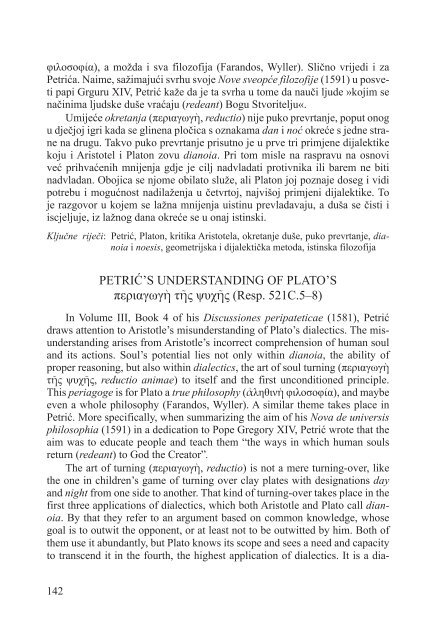Programska knjižica - Hrvatsko filozofsko društvo
Programska knjižica - Hrvatsko filozofsko društvo
Programska knjižica - Hrvatsko filozofsko društvo
Create successful ePaper yourself
Turn your PDF publications into a flip-book with our unique Google optimized e-Paper software.
φιλοσοφία), a možda i sva filozofija (Farandos, Wyller). Slično vrijedi i za<br />
Petrića. Naime, sažimajući svrhu svoje Nove sveopće filozofije (1591) u posveti<br />
papi Grguru XIV, Petrić kaže da je ta svrha u tome da nauči ljude »kojim se<br />
načinima ljudske duše vraćaju (redeant) Bogu Stvoritelju«.<br />
Umijeće okretanja (περιαγωγὴ, reductio) nije puko prevrtanje, poput onog<br />
u dječjoj igri kada se glinena pločica s oznakama dan i noć okreće s jedne strane<br />
na drugu. Takvo puko prevrtanje prisutno je u prve tri primjene dijalektike<br />
koju i Aristotel i Platon zovu dianoia. Pri tom misle na raspravu na osnovi<br />
već prihvaćenih mnijenja gdje je cilj nadvladati protivnika ili barem ne biti<br />
nadvladan. Obojica se njome obilato služe, ali Platon joj poznaje doseg i vidi<br />
potrebu i mogućnost nadilaženja u četvrtoj, najvišoj primjeni dijalektike. To<br />
je razgovor u kojem se lažna mnijenja uistinu prevladavaju, a duša se čisti i<br />
iscjeljuje, iz lažnog dana okreće se u onaj istinski.<br />
Ključne riječi: Petrić, Platon, kritika Aristotela, okretanje duše, puko prevrtanje, dianoia<br />
i noesis, geometrijska i dijalektička metoda, istinska filozofija<br />
PETRIĆ’S UNDERSTANDING OF PLATO’S<br />
περιαγωγὴ τῆς ψυχῆς (Resp. 521C.5–8)<br />
In Volume III, Book 4 of his Discussiones peripateticae (1581), Petrić<br />
draws attention to Aristotle’s misunderstanding of Plato’s dialectics. The misunderstanding<br />
arises from Aristotle’s incorrect comprehension of human soul<br />
and its actions. Soul’s potential lies not only within dianoia, the ability of<br />
proper reasoning, but also within dialectics, the art of soul turning (περιαγωγὴ<br />
τῆς ψυχῆς, reductio animae) to itself and the first unconditioned principle.<br />
This periagoge is for Plato a true philosophy (ἀληθινὴ φιλοσοφία), and maybe<br />
even a whole philosophy (Farandos, Wyller). A similar theme takes place in<br />
Petrić. More specifically, when summarizing the aim of his Nova de universis<br />
philosophia (1591) in a dedication to Pope Gregory XIV, Petrić wrote that the<br />
aim was to educate people and teach them “the ways in which human souls<br />
return (redeant) to God the Creator”.<br />
The art of turning (περιαγωγὴ, reductio) is not a mere turning-over, like<br />
the one in children’s game of turning over clay plates with designations day<br />
and night from one side to another. That kind of turning-over takes place in the<br />
first three applications of dialectics, which both Aristotle and Plato call dianoia.<br />
By that they refer to an argument based on common knowledge, whose<br />
goal is to outwit the opponent, or at least not to be outwitted by him. Both of<br />
them use it abundantly, but Plato knows its scope and sees a need and capacity<br />
to transcend it in the fourth, the highest application of dialectics. It is a dia-<br />
142

















